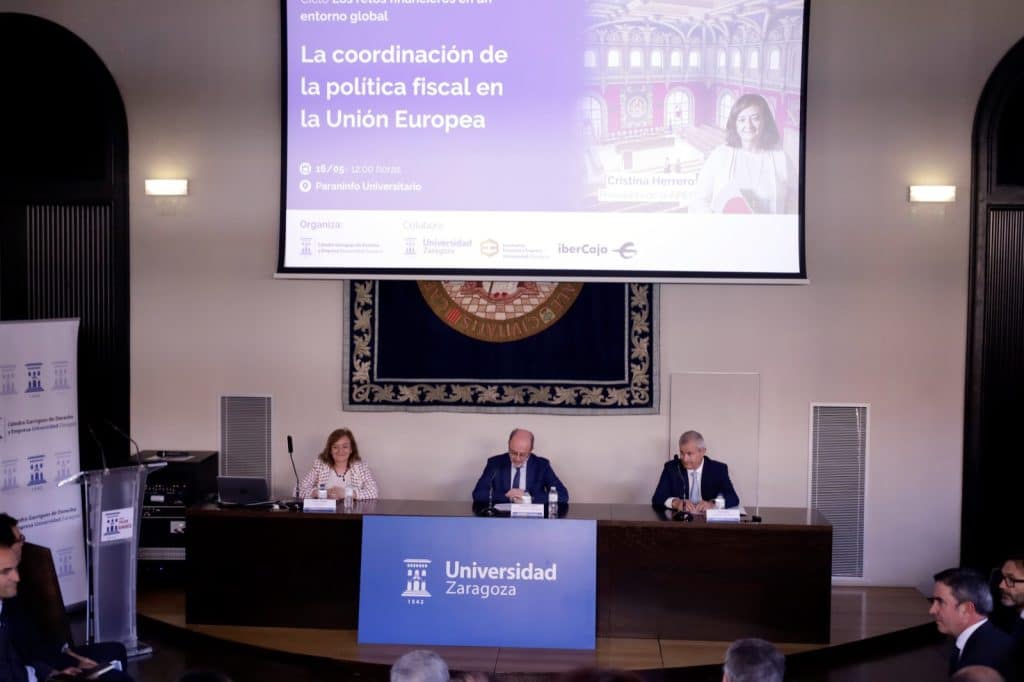
The president of the Independent Authority for Fiscal Responsibility (AIReF), Cristina Herrero, gave a lecture on fiscal policy coordination in the European Union at the University of Zaragoza, as part of the tenth anniversary of the bilingual degree in Business Administration and Management (ADE). During her speech, she reviewed the evolution of fiscal coordination from the years prior to the outbreak of the pandemic to the current moment, in which a return to fiscal rules is expected, with a new framework of fiscal governance.
Before the pandemic, fiscal coordination was based on the existing European fiscal framework, linked to the Stability and Growth Pact. This Pact had been reformed twice before Covid-19 and the second reform, carried out in 2011 after the financial crisis, led to the creation of Independent Fiscal Institutions (IFIs) such as AIReF, which were created with the aim of supervising compliance with fiscal rules.
Specifically, AIReF was created in 2013 and began operating in 2014 with the central objective of ensuring the sustainability of public finances. Today, and after reforming its statute twice, fiscal supervision and the assessment of public policies are the institution’s main functions. These functions, as the chairwoman stressed, are carried out under its three guiding principles: independence, transparency and accountability.
The outbreak of the pandemic, however, led to the suspension of the fiscal rules, although this has in no way implied a lack of attention to sustainability on the part of AIReF, an absence of fiscal supervision or the abandonment of the debate on the third reform of the fiscal framework. In fact, during this time AIReF has continued to publish the mandatory reports adapting to the context and has assessed the anti-crisis measures, compliance with European recommendations and the impact of the Recovery, Transformation and Resilience Plan (PRTR).
The future framework
In 2024, Cristina Herrero pointed out, the fiscal rules will be reactivated with a new fiscal governance framework that is more adapted to national specificities and a strengthening of the IFIs. This reinforcement, as the president argued, is particularly appropriate in a decentralised country like Spain, where AIReF acts as an integrating link between the European and national frameworks.
The new framework will also focus on the quality of public finances and the assessment of the efficiency and effectiveness of public policies. This is essential for an institution like AIReF because of its evaluation function. The institution is currently finalising the third phase of the Spending Review 2018-2021, which will be published this year. It is also immersed in the first phase of the Spending Review 2022-2026 and is developing other evaluations, such as the second Minimum Living Income (MVI) Opinion and the assignments requested by the Autonomous Regions. In fact, 11 regions have already requested one or more assessments from AIReF.
The president pointed out that AIReF has been actively involved in the debate on the reform of the European fiscal framework. In January 2022 it contributed to the European Commission’s public consultation on the review and in November of the same year it published a technical document with AIReF’s own proposal. It has also insisted on several occasions on the need to make progress, with or without European reform, on the reform of the national framework.
AIReF has also taken into account the spirit of what appears to be the new European standard when drawing up the report on the Stability Programme Update (SPU) 2023-2026, placing the focus on sustainability. In that report AIReF points out that, although a reduction in the deficit and debt is forecast for the period analysed, the long-term analysis shows that the stabilisation of the deficit is insufficient to put the debt on a downward trajectory and reduce vulnerability, as it seems the future fiscal framework will require.





